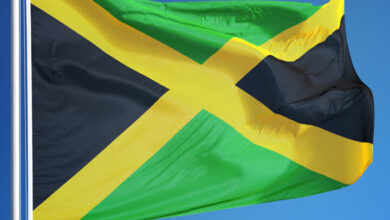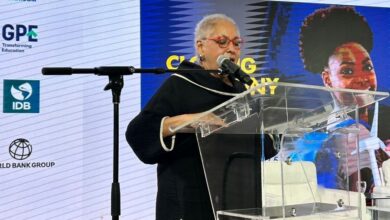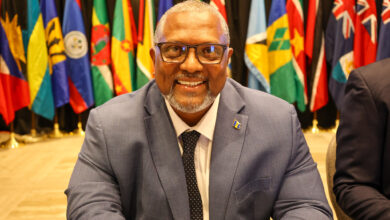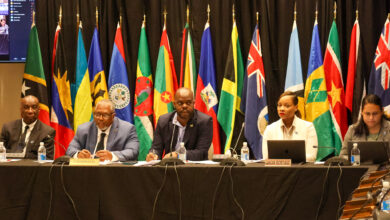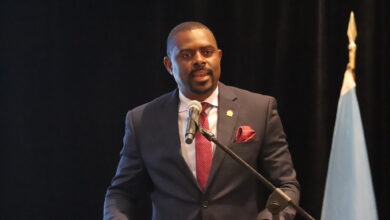Honorable Ministers
Mrs. Deputy Secretary General of CARICOM and Assistant Secretary General of CARICOM
Permanent Secretaries
Representatives of Ministries
Members of the CARICOM Secretariat
Ladies and Gentlemen
Guests,
On behalf of Suriname and myself I am honoured to represent Suriname, which accede to Chair of the Seventh Meeting of the Council of Human and Social Development at this meeting.
I want to thank the outgoing Chair, the Honorable Minister H.E. Douglas Slater from St. Vincent and the Grenadines for his excellent work as Chairman of the COHSOD.
I bring you greetings from our President His Excellency Ronald R. Venetiaan who holds the Regional Portfolio for Culture, Youth, Sports and Gender in the Quasi Cabinet of the Community, all of which under the Umbrella of COHSOD. We therefore have a special affinity with the work of this Council and a commitment to its success.
We are all members of our respective National COHSOD commissions that held our meetings where we discussed the very intensive agenda that will engage the attention of the delegates at this meeting. During these discussions we recognized how much more we need to learn about the actual functioning of Caribbean Community, but at the same time the overwhelming challenges that we in the Social Sectors face in promoting a more coherent approach to the Region’s development.
Suriname is one of the countries of the Caribbean Community that truly portrays a diversity of cultural elements. The diversity traces it origins of many cultures of the world including the indigenous, Europeans, Asians, Africans, Chinese and Javanese.
Under Dutch rule and since achieving independence the patterns of development and the aspirations of Suriname to overcome underdevelopment and poverty run parallel to the rest of the Caribbean.
In the recent past, we in Suriname have had to learn to deal with conflict with a potential to destroy the base of society, our human potential that is the focus of this meeting.
It is in this context, that the work of COHSOD and the emphasis on investing in human resources with equity assumes great importance. In our deliberations as Suriname National COHSOD Commission we were stimulated by the objectives of the Futures Policy Group, which is charged with the responsibility for developing a human and social development strategy.
We believe that the elements that are identified in the work of this group are very important as they help us to think more carefully about the feasibility of adopting an inter-sectoral approach to regional development. In so far as this exercise helps to unify the focus of social sector ministries and to create value added dimensions to national policies it is invaluable especially at this juncture of the regional movement toward a CARICOM Single Market & Economy.
Increasingly in this era of globalization the Caribbean Economies are under stress. They are forced to compete on a playing field that is not leveled and by the rules of liberalization that show little regard for practice of equity. The movement to accelerate the process toward a Caribbean Single Market and Economy (CSME) appears to offer us the best prospects for this CARICOM Community of relatively small states.
In this regard, the establishment of National Accreditation Bodies is accorded the highest priority. The focus should be on getting all Member States fully committed to having their National Accreditation body in place.
We were very impressed by the Organization of Eastern Caribbean States Human Development Report: Building Competitiveness in the Face of Vulnerability. Its fundamental message is that, the purpose for investing in human development is to enlarge people’s choices in such a way that it is equitable. The development of an Adjusted Human Development Index (AHDI) in this Report is an innovative adaptation of the pioneering work of UNDP, which introduced the concept of a Human Development Index in the mid 1980s.
This HDI measure has since gained much credibility as a device that truly incorporates the human component rather than only the tradition per capita income comparison as an assessment of development.
We have the very intensive and interesting agenda, which includes vital issues such as technology in education, accreditation systems, HIV/AIDS, crime and security and the rights of children.
Due to the importance of the rights of the children there has been a special meeting of Ministers responsible for children’s affairs prior to this COHSOD meeting.
I’m convinced that the development of a regional framework for action will contribute to an effective monitoring of national and regional responses to the outcome document: “A World fit for Children”
In this year we will put forth more efforts in meeting the objectives for the Implementation of the Caribbean Early Childhood Development Plan of Action. Following the recommendation of the Fourth ECD conference, we should at least start with developing a structured approach to ECD programming at a National Level and to begin the process of establishing ECD on a sustainable financial base.
Within the CARICOM Region our governments have strongly committed themselves to combat with all efforts the AIDS pandemic.
However, besides this problem our region is facing two more serious diseases, which will hamper our development if we cannot control them. I am talking now of Dengue fever and Malaria, both vector born diseases.
Dengue and dengue hemorhagic fever is becoming an enemy we cannot ignore. The surveillance of this disease must be improved and financial resources must be mobilized to spend on vector control.
Furthermore, much effort must be taken to seek behavioural change which is at the base of all above-mentioned diseases will be adamant in preventing them.
The second mosquito born disease of great concern, especially for Guyana and Suriname is malaria. Development projects in the hinterland can experience many problems with sick labourers. Since, Eco-tourism is growing in our region, we therefore have to control malaria.
Countries that are free of malaria transmission must be on alert for import cases.
Regional action must be taken to fight malaria. In doing so, financial assistance will be sought by the Global Fund against AIDS, Malaria and Tuberculosis.
I am happy to note that issues on youth feature in this agenda. They are indeed the essence of our investment in the future of the Region. Exactly two months ago, I had the pleasure of interacting with 28 CARICOM Youth Ambassadors at the CARICOM Youth Forum held in Suriname. At that Forum our President inducted these Youth Ambassadors who are to serve in this role for 2 years.
The Youth Ambassadors concept is a very useful one approved by our Heads of Government. President Venetiaan who has the responsibility for Regional Youth Affairs is very committed to the development of the goals set out by these Ambassadors in their Declaration of Paramaribo in August 2002. I implore the Ministers of Culture, Directors of Culture and indeed the entire COHSOD to support this venture as a truly important investment in our human resources.
We in Suriname have embraced the fact that the current Dean of the CARICOM Youth Ambassadors Corp is Ambassador Ms. Valerie Lalji, a Surinamese. In an effort to ensure that she can discharge of her responsibilities the Government of Suriname has provided her with accommodation within the Ministry of Education and Community Development and is taking every opportunity to ensure that she and her alternate Mr. Sergio Belfor receive the support and respect that their office commands.
In return we demand of them to demonstrate a sense of responsibility and a good example as Ambassadors for the Suriname Youth Movement and the Caribbean Community. They and other youth Ambassadors around the region can be among the most sustainable advocates of this Regional venture that we have an obligation to make it into a success.
Let us together light the path for leadership of our Youth. We must continually light the paths for new leaders to be the torchbearers in helping them to guide in organizing and carrying out the many far-reaching programmes within the CARICOM.
We are pleased that at this COHSOD, the Suriname delegation is scheduled to make a presentation on the Plans for CARIFESTA VIII which we have the honour to host in Suriname from August 25th to the 30th, 2003.
The theme of CARIFESTA VIII: “Cultural Diversity”.
The slogan “ Many cultures. The essence of togetherness – The spirit of the Caribbean is significantly related to the discourse on cohesion and creativity in human resource development.
The rest of the Suriname delegation and I, will have an opportunity to present our plans during the final session of this meeting. Then you will have a better idea of what Suriname has to offer the Region and, how we plan to work as part of this Community, using the various art forms to connect with the essence of investing in human resources with equity.
Finally, I have the intention to chair the Council of Human and Social Development to the best of my knowledge. I am convinced that with the support of the CARICOM Secretariat and all participating delegations we will succeed to solve many of the important issues.
Thank you.

